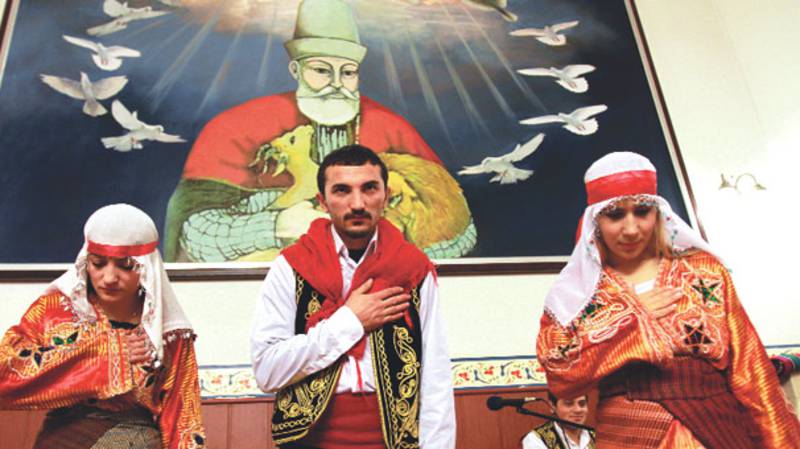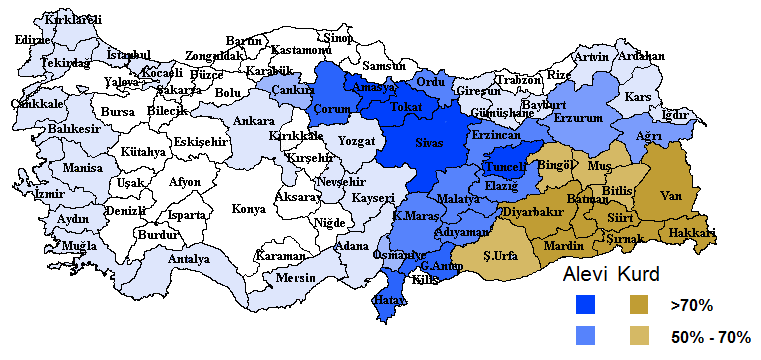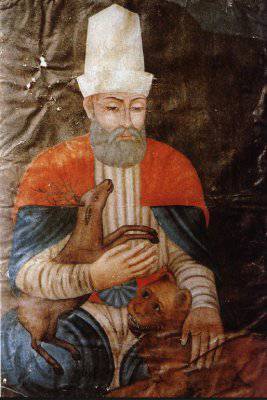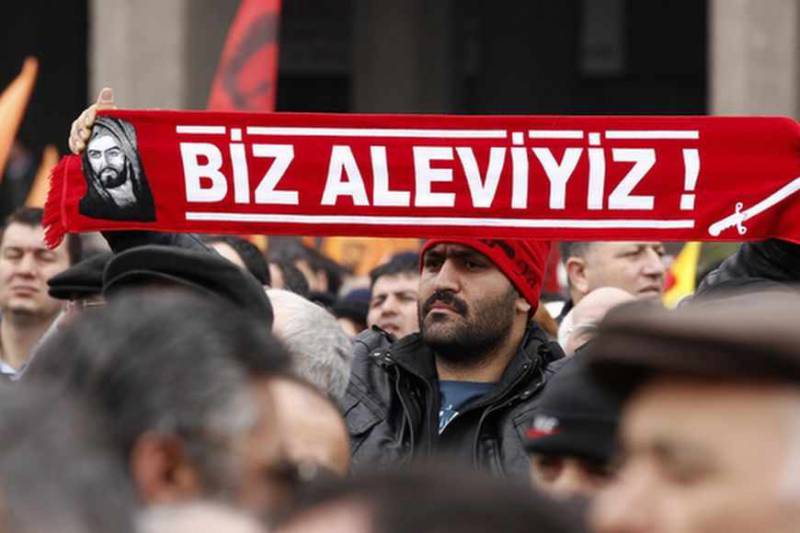Turkish decomposed. Alevites: Discrimination, Protests, and Future
Political preferences in Turkish society are also very often associated with religious and ethnic identity. For example, many people know that in Turkey there is a very numerous and diverse left-wing movement, including a number of parties, parties and groups of the most diverse political orientation - from moderate European-style socialists to radical Maoists and anarchists. But it is missing that the majority of the Turkish left relies on the support of two main groups of the country’s population - the Kurds, who require a separate story, and the Alevis, representatives of the extreme religious trend in Islam, which some researchers even distinguish as a separate religion . At the same time, Alevit can be both a Kurd and a Turk by nationality. In modern Turkey, according to various sources, from 10 to 25% of the population are Alevis. Who are the Alevis and what is their role in Turkish society, we will try to make out below.

The Alevites are one of the most interesting Middle Eastern religious movements with a complex and controversial history. Very mysteriously even the origin of the name of the Alevis. According to the most common version, the Alevis are “followers of Ali,” that is, the cousin and son-in-law of the Prophet Muhammad, especially revered by Muslims - Shiites. That is, the name of the Turkish Alevis repeats the name of the Syrian Alawites, who are also considered to be followers of Ali. In the extreme directions of Shiism, Ali is an over-readable figure, revered even more than the Prophet Muhammad himself. Extreme areas of Shiism - Alevis, Alawites, "Ali-Illahi" and some others - are widespread in the Middle East and have a very interesting and poorly studied history. Throughout their existence, these religious groups developed very difficult relations with orthodox Islam. The authorities of the Ottoman Empire pursued extremely Shiite groups, considering them not only to be heretics from Islam, but also potential agents of Iranian influence (Shiite Iran was considered the main regional competitor of Ottoman Turkey). Turkish Alevis, Syrian Alevis and other similar groups were subjected to discrimination by the Sunni majority of Arabs and Turks.
The uniqueness of Alevism lies in the fact that it absorbed not only Shiite religion, but also many components of Eastern Christianity, Zoroastrianism, Manichaeism, that is, religions prevalent in the Middle East and in Asia Minor before the establishment of Islam. But even after Islamization, many Asian communities have embraced Islam only superficially. Alevism became a peculiar form of adaptation of local pre-Islamic traditions to the conditions of life in the Ottoman Empire. The three cornerstones of Alevism are respect for all people, loyalty to other ethnic and religious groups, and respect for labor and workers. Alevites consider themselves to be genuine carriers of the Turkish cultural code, an expression of a unique cultural environment that integrated the cultures of numerous peoples of Asia Minor - Armenians, Assyrians, Greeks, Kurds, Zaza, Turkic nomadic tribes.
In Turkey, the Alevi environment is not unified ethnically and socially, but the Alevi dogma itself is the basis of the supra-ethnic Alevi identity. Turkish Alevis are divided into many subgroups, to understand the intricacies of which is very difficult. Ethnically, the majority of Alevis are Kurds and Zaza, but there are also a large number of Turkic groups - Alevis. When they talk about the problem of inter-ethnic relations in Turkey, the “Kurdish question” comes out on top. The Zaza people are far less well known outside the country, although it numbers more than two million people.

Iranian-speaking people of Zaza inhabit the eastern regions of Turkey - the Armenian Highland. Often, Zaza belongs to the Kurds, which is also promoted by the self-name of some groups of Zaza - “Kyrgyzman”. But it is not so. Zaza speak the language of Zazaki, only remotely related to Kurdish dialects, and they moved to the Armenian Highlands from Gilan - a region in northern Iran, on the shores of the Caspian Sea. In the Middle Ages, the mountainous areas of Gilan were called Deylem, and their inhabitants, respectively, deylemites. Christianity of the Nestorian professing before the Arab conquest of Iran (now only Assyrians remained loyal to Nestorianism in the Middle East), in the 9th century the Deilemites adopted Shiite Islam. The militancy and love of freedom of the highlanders, the deulemites, became famous throughout the Middle East. Migrated to the Zagros Mountains, the deylemites gained fame here as Zaza. Zaza themselves often call themselves “smokes”, that is, “deylemits.”
Like the Kurds, the Turkish Zaza retain tribal division, and by religion most Zaza are Alevis. It was this circumstance, in combination with the non-Turkic origin of Zaza, that caused the negative attitude of the Ottoman, and then the Turkish authorities to the descendants of the proud deulemites. When another Kurdish uprising was suppressed in Dersim in 1938, in which Zaza participated, many of the Zazus were resettled in other parts of Turkey, including the cities of Aydin, Bursa, Denizli, Zonguldak, Kütahya and a number of others. During the second half of the twentieth century, many zaza emigrated outside of Turkey, with the result that numerous diasporas of this people formed in Germany, Austria, the Netherlands, Belgium and Switzerland. Given the alevit identity of the majority of Zaz, many representatives of this nation support the left parties of Turkey. Zaza by nationality is Selakhattin Demirtas - co-chairman of the socialist Democratic Party of Peoples, one of the most popular Turkish left and pro-Kurdish politicians, a sharp critic of Erdogan’s policy.
Orthodox Sunnis often do not even recognize that Alevis belong to the Muslim Ummah. This is due to a very different world view and behavior of Alevis. Alevites do not attend mosques, but pray in their own prayer houses, “jami”. Men and women pray together, and Alevis have a much more loyal attitude towards women. Most Alevis do not comply with the traditional prescriptions and prohibitions of Islam, in particular - they consume wine, including for ritual purposes, they can afford to eat food that is not allowed by Islam. The Alevites who live in Ortaja are convinced that since Caliph Ali was killed during a namaz prayer in a mosque, all of his followers were relieved of the duty of performing namaz and visiting mosques. It is not mandatory for Alevis to fast Ramadan a month, although Alevis fast 12 days a month to Muharram in memory of the martyrs of Karbala worshiped by Shiites (during the Battle of Kerbel in 680, Caliph Yazid ibn Mu'awiya decapitated Imam Hussein, son of Ali and his grandson, prophet and also killed many of his followers).
 The teachings of the Alevis have much in common with the Sufi Order Bekashiyya - the followers of Haji Bektash. Bektashi had the glory of free-thinkers in the Ottoman Empire, in Turkish folklore there are many stories about them resembling the stories of Khoj Nasreddin. It was Bektaashiyya who was considered the Order - patron of the Turkish Janissaries, which had a very rational explanation. The Janissaries, who had Slavic, Caucasian, and Greek origins, were alien to orthodox Islam, and therefore they were close to the tradition of Bektashe, borrowing many components of Christianity. When an uprising of the Janissaries was suppressed in the Ottoman Empire in 1826 and the Janissary Corps was liquidated, the authorities officially banned not only Bektashey, but also Alevis.
The teachings of the Alevis have much in common with the Sufi Order Bekashiyya - the followers of Haji Bektash. Bektashi had the glory of free-thinkers in the Ottoman Empire, in Turkish folklore there are many stories about them resembling the stories of Khoj Nasreddin. It was Bektaashiyya who was considered the Order - patron of the Turkish Janissaries, which had a very rational explanation. The Janissaries, who had Slavic, Caucasian, and Greek origins, were alien to orthodox Islam, and therefore they were close to the tradition of Bektashe, borrowing many components of Christianity. When an uprising of the Janissaries was suppressed in the Ottoman Empire in 1826 and the Janissary Corps was liquidated, the authorities officially banned not only Bektashey, but also Alevis. The followers of Alevism were subjected to persecution, were forced to conceal their faith, which contributed to the transformation of the Alevi groups into secluded and disguised communities. The Alevites strongly supported the reforms of Mustafa Kemal Ataturk, because they saw in them the long-awaited deliverance from religious oppression. In secular Turkey, as it seemed, the Alevis had the opportunity of both upward social mobility and active participation in the political life of the country. However, Alevich groups soon faced new challenges. The Kemalists were guided by the principle of “one state - one nation”, which suggested a course of ignoring national minorities, their interests, and religious and cultural characteristics. Since the majority of Alevis belonged to Iranian-speaking Kurds and Zaza, they were most affected by the discrimination of the authorities. The historian Nezdat Saraci believes that the Turkish authorities intentionally obstructed the socio-economic and cultural modernization of the regions of Eastern Anatolia, where most of the Alevis lived - Kurds and Zaza.
The state did not invest in the development of agriculture (and Eastern Anatolia - a purely agrarian region), in education and health care. Living in the backward areas of Eastern Anatolia, the Alevis were in fact deprived of the opportunity to participate in the political life of Turkey. The only exceptions were those Alevis who lived in Western Anatolia and in large cities. But the backwardness of the eastern regions, artificially supported by the Turkish authorities, ultimately led to an increase in migration of Alevis to the cities. Urbanization gave a new life to the doctrine of the Alevis - in the urban environment socialist ideas had a strong influence on the Alevis. It is worth noting that in many large cities of Turkey there have long been an impressive number of Alevi communities, including many intellectuals who have always adhered to a secular lifestyle and opposed the interference of religious fundamentalists in the political life of the country. Some Alevis compare their position in Turkey with the position of the Jews in the old Europe or in the Russian Empire. This statement is especially true with respect to the Alevi intelligentsia, which, despite the availability of education, a certain social status and financial resources, is in fact deprived of the opportunity to delegate its representatives to the highest authorities.
The harassment of the Alevis did not stop in modern Turkey. Before the collapse of the Soviet Union, one of the main accusations against the Alevis was cooperation with the communists and pro-Soviet sentiments. The position of the Alevis worsened even more after the religious-conservative circles came to power in Turkey. Religious fundamentalists accuse the Alevis of violating the principles of Islam, the debauchery of women, the use of alcohol and pork, and belief in the transmigration of souls, which is regarded as a relic of pagan beliefs. For Turkey, it is not uncommon to occasionally flare up violent pogroms of Alevis. Thus, in 1978, in the city of Kahramanmaras in southeastern Turkey, government forces brutally killed over 200 Alevis, thousands of people were driven out of their homes, and their homes were destroyed. In 1993, in Sivas, mass alevite pogroms by religious fanatics took place. Then religious extremists burned 30 people alive. The Turkish government is actually condoning the anti-Jewish sentiments of the fundamentalists, because they see in Alevis a very unreliable and potentially protesting group that does not fit into the concept of Turkish national identity based on Sunni Islam and the Turkish language. The president of Turkey Recep Erdogan does not differ in loyalty to Alevis. Even when he was mayor of Istanbul, Erdogan ordered to demolish the prayer house of local Alevis. When Erdogan led the Turkish government, discrimination against Alevis intensified. In particular, in schools, children from Alevit families are forced to study the fundamentals of the Sunni trend in Islam, which, of course, is part of Turkey’s state policy on the destruction of Alevi religious identity.
In turn, Alevis try to resist discrimination - each in its own way. Someone will emigrate forever from Turkey to Europe or the USA, someone tries to disguise his Alevi identity and pretends to be a secular Turk, someone takes the path of active resistance. The alevits have nothing to love the state, which all its history has connived to the bloody pogroms and murders. Although while Kemalists were in power, there was still hope for a gradual normalization of relations between Alevis and Sunnis, Alevis and the Turkish authorities, in the light of the current political situation in Turkey and in the Middle East as a whole, it becomes increasingly illusory. In Syria, Syrian Alawites close to Turkish Alevis are fighting against the fundamentalist religious groups of Sunni Arabs, and this confrontation inevitably affects the attitude towards Alevis in Turkey itself. In addition, Turkey has given shelter to millions of Syrian refugees who brought their own hatred of Alevis to the host society, whom they consider to be the co-religionists of their enemy Bashar al-Assad.
Speaking for a secular state, Alevis, for obvious reasons, for the most part are critics of Erdogan's policy. Many young Alevis sympathize with radical left organizations and take part in street demonstrations. At the same time, it should be understood that Alevis, who are many among the intelligentsia, do not have serious positions in the army, police and special services. Their element is street performances, the activities of the left radical underground, but not military uprisings and coups. Therefore, they are simply unable to resist the Erdogan regime by conspiracies, another thing is when it comes to mass demonstrations on the streets of Turkish cities, sending volunteers to rebel groups in Turkish and Syrian Kurdistan. It is clear that within the framework of the political system that is established in Turkey under the rule of Erdogan, the Alevis have less hope not only to improve their position, but even to have a quiet life, free from discrimination and pressure from religious fundamentalists and the government supporting them. .

Information